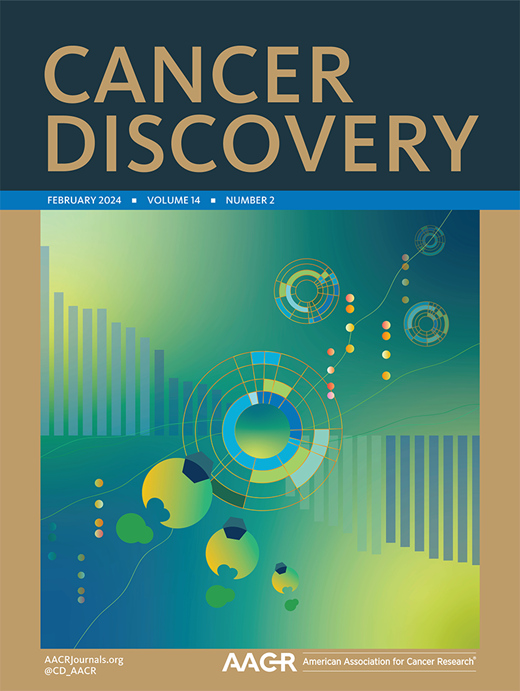Glucocorticoids Unleash Immune-dependent Melanoma Control through Inhibition of the GARP/TGF β Axis
IF 33.3
1区 医学
Q1 ONCOLOGY
引用次数: 0
Abstract
Half of patients with advanced melanoma fail to benefit from immune checkpoint blockade, and novel treatments are urgently required. Testing topical medications for anticancer activity in an immunotherapy-resistant murine melanoma model, we found that, counterintuitively, glucocorticoids (GCs) elicit rapid cytotoxic T lymphocyte (CTL)-dependent tumor control. Genetic ablation of the GC receptor in different cellular compartments revealed that GCs acted not on immune cells but directly on tumor cells to downregulate the expression of glycoprotein A repetitions predominant (GARP). This inhibited TGF β signaling and unleashed CTL killing. In agreement, GCs stimulated tumor control in multiple cancer models but only if the tumors also responded to pharmacologic inhibition of TGF β signaling. Furthermore, patients with melanoma with high GC receptor expression or signaling showed improved prognosis and lower TGF β signaling in tumor-infiltrating CTLs. Additionally, elevated GARP expression correlated with reduced survival, including in immunotherapy-treated patients. Thus, the GARP/TGF β axis emerges as a GC-sensitive cancer cell–intrinsic immune-evasive mechanism. Significance: This study uncovers a surprising role for GCs in triggering CD8+ T cell–dependent tumor control through downregulation of GARP and thus TGF β signaling. Analysis of samples from patients with melanoma suggested that GARP expression may serve as both a biomarker of poor antitumor immunity and a therapeutic target to improve the response to immunotherapy.糖皮质激素通过抑制GARP/TGF β轴释放免疫依赖性黑色素瘤控制
一半的晚期黑色素瘤患者不能从免疫检查点阻断中获益,迫切需要新的治疗方法。在免疫治疗耐药的小鼠黑色素瘤模型中测试局部药物的抗癌活性,我们发现,与直觉相反,糖皮质激素(GCs)引发快速细胞毒性T淋巴细胞(CTL)依赖的肿瘤控制。基因消融不同细胞区室的GC受体表明,GC不作用于免疫细胞,而直接作用于肿瘤细胞下调糖蛋白A重复显性(GARP)的表达。这抑制了TGF β信号传导并释放了CTL杀伤。与此一致的是,在多种癌症模型中,GCs刺激肿瘤控制,但前提是肿瘤也对TGF β信号的药理抑制有反应。此外,GC受体高表达或信号转导的黑色素瘤患者预后改善,肿瘤浸润性ctl中TGF β信号转导降低。此外,GARP表达升高与生存率降低相关,包括在免疫治疗的患者中。因此,GARP/TGF β轴作为gc敏感的癌细胞内在免疫逃避机制出现。意义:本研究揭示了GCs通过下调GARP从而下调TGF β信号,在触发CD8+ T细胞依赖性肿瘤控制中的惊人作用。对黑色素瘤患者样本的分析表明,GARP表达可能既是抗肿瘤免疫能力差的生物标志物,也是改善免疫治疗反应的治疗靶点。
本文章由计算机程序翻译,如有差异,请以英文原文为准。
求助全文
约1分钟内获得全文
求助全文
来源期刊

Cancer discovery
ONCOLOGY-
CiteScore
22.90
自引率
1.40%
发文量
838
审稿时长
6-12 weeks
期刊介绍:
Cancer Discovery publishes high-impact, peer-reviewed articles detailing significant advances in both research and clinical trials. Serving as a premier cancer information resource, the journal also features Review Articles, Perspectives, Commentaries, News stories, and Research Watch summaries to keep readers abreast of the latest findings in the field. Covering a wide range of topics, from laboratory research to clinical trials and epidemiologic studies, Cancer Discovery spans the entire spectrum of cancer research and medicine.
 求助内容:
求助内容: 应助结果提醒方式:
应助结果提醒方式:


